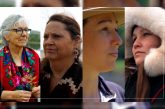
Students at Inuksuk High School. All photos by Tess Thurber.
2019 was a year to celebrate and reflect in Nunavut. It was the territory’s 20th anniversary and the 50th anniversary of the 1969 Supreme Court of Canada’s decision that began the process to decriminalize homosexuality in Canada. There has been a lot of progress over these years in improving the lives of Nunavummiut but there is still much work to be done in terms of improving equity throughout the North. Issues of identity and belonging for Nunavut youth is one struggle that continues to unfold. Inuit have experienced various forms of disruptions to cultural and community continuity, which, among other things, has resulted in the struggle to define and reclaim a sense of identity. Identity creation is the burden of youth everywhere but for Nunavut’s youth this also carries the weight of historical injustices.
The creation of Nunavut was, and is, an act of reclamation. The establishment of this new territory, within a comprehensive land claim, gave Nunavummiut many rights and legal jurisdiction over most aspects of their lives, guided by Inuit societal values. Even though the territory has provided youth with these inherent rights, Nunavut’s colonial history continues to constrain their ability to fully express some aspects of their identities. Tunnganarniq is the societal value of an open, welcoming, and inclusive society, but sexual and gender identity remains a difficult topic for discussion. It is in this spirit of inclusion that the annual Pride Week at Iqaluit’s Inuksuk High School that youth are ensured the security to declare their full identity.

The 2019 edition of Pride Week was itself a milestone as it was the fifth year of this event. The aim of this week is to grow awareness and acceptance of gender and sexual identity in Nunavut society and is organized and facilitated by the school’s Positive Space Club. The club meets twice a week to help provide a safe and inclusive space for all students. The group promotes diversity and equality for all. This is an important message for young people to see represented in public spaces.
This year’s activities and events included: the raising of a pride flag, a drag workshop with local drag queen Ari Hola, a pride dance and assembly, an open mic night, and a performance by local queer comic Bibi Bilodeau. Members of the Canadian Center for Gender and Sexual Diversity were also in town to deliver workshops on queering the curriculum and an information night for the community and parents about how-to best support youth in navigating gender and sexuality identity.
 Nunavut has also benefited from the recent addition of 2S [two Spirit] to the acronym of LGBTQ, which has allowed for the emergence of Queer Indigenous perspectives within the trajectory of the Pride movement. Within the history of colonialism, sexuality and gender identity also suffered under the weight of Canadian notions of identity. “2S” refers to two spirited, an historical and contemporary identifier connected to gender roles in many Indigenous communities that existed prior to contact. The queering efforts of the 2SLGTBQ+ community has a lot to offer our collective decolonization efforts by challenging the discomfort of many when it comes to gender and sexual identity. Questions of sexual and gender identity within Inuit society was taken up in the excellent documentary Two Soft Things, Two Hard Things (2016) and Inuksuk High School, Nunavut’s biggest high school, has added to this momentum through its annual Pride Week.
Nunavut has also benefited from the recent addition of 2S [two Spirit] to the acronym of LGBTQ, which has allowed for the emergence of Queer Indigenous perspectives within the trajectory of the Pride movement. Within the history of colonialism, sexuality and gender identity also suffered under the weight of Canadian notions of identity. “2S” refers to two spirited, an historical and contemporary identifier connected to gender roles in many Indigenous communities that existed prior to contact. The queering efforts of the 2SLGTBQ+ community has a lot to offer our collective decolonization efforts by challenging the discomfort of many when it comes to gender and sexual identity. Questions of sexual and gender identity within Inuit society was taken up in the excellent documentary Two Soft Things, Two Hard Things (2016) and Inuksuk High School, Nunavut’s biggest high school, has added to this momentum through its annual Pride Week.
Youth culture has always been a vibrant site for exploring identity and demonstrating diversity. Iqaluit’s youth have demonstrated their inclusivity through their annual participation in Pride Week. And as Pride Week has concluded for another year at Inuksuk High School, it gives us pause to consider how we create identity as individuals and how we share identity as communities. To queer our thinking is to think deeply about the ways we see ourselves by contemplating who we are and for whom.









